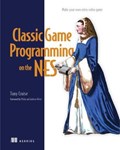Build your own retro games for the Nintendo Entertainment System.
Do you have an amazing idea for a NES game you’ve been itching to turn into reality? Classic Game Programming on the NES will show you how. This all-practical beginner's guide is full of step-by-step guidance on everything from graphics and music, to enemy AI, to the 6502 Assembler language you need to get the most out of the NES.
Inside Classic Game Programming on the NES you’ll learn how to:
When you’re developing retro games, it’s dangerous to go alone—so take this essential guide! Classic Game Programming on the NES is an all-in-one handbook to the resources you need to start building for the NES. You’ll learn to understand modern emulators and discover the secrets of programming in ages past. Best of all, you won’t need any specialist experience! Even highly technical elements are broken down into step-by-step instructions, and fully illustrated with easy-to-follow diagrams.
Foreword by Philip and Andrew Oliver.
About the technology
Nintendo Entertainment System (NES) games like Super Mario Bros and The Legend of Zelda shaped the video game industry and defined childhood for millions of gamers worldwide. Bring back the magic by creating your own NES games! All you need is this book and your imagination––no game dev experience or specialist programming skills required.
About the book
Classic Game Programming on the NES distills the scattered secrets of NES development into clear instructions for building your first games for the Nintendo Entertainment System. You’ll learn about the NES’s unique design, the surprisingly simple 6502 Assembly language, and more. As you go, you’ll create a simple space-based shoot-em-up that gives you a pattern you can follow to build anything you can dream up on your own.
What's inside
About the reader
No game programming experience required.
About the author
Tony Cruise is a legend in the field of retro games. In the 80’s he programmed games for 8-bit systems; now he creates resources for developers working with 8 and 16-bit systems.
The technical editor on this book was Dan Weiss.
Table of Contents
1 Let’s program games!
2 Getting set up
3 Starting 6502 Assembler
4 Math, loops, conditions, and bits
5 Starting somewhere
6 Starting a game
7 Move and shoot
8 Enemy movement
9 Collision detection
10 Keeping score
11 Player collisions and lives
12 More enemies
13 Animations and more
14 Sound effects
15 Music
16 Where to from here?

